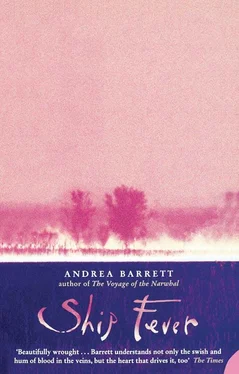Selling the house was remarkably easy. Zaga didn’t tell her stepchildren what she was doing, and she didn’t consult Joel’s lawyer or his accountant. A few months after Joel’s funeral, she sold the house for much less than her real-estate agent advised. Once she had a closing date she sold most of the furniture as well. She’d chosen every piece of it herself, except for the family heirlooms; she’d decorated each of the rooms and designed the kitchen in which she’d cooked the meals that had stunned Joel’s friends but never truly made them like her. Joel had built the house for her, and she knew he’d assumed she would stay there. But in his absence the silent rooms seemed intolerable.
At night her dreams wound through blizzards and mountains she couldn’t recognize. During the day she cleared out the house alone. Her stepchildren were nearby — Alicia lived in Meadowbrook and Rob in downtown Philadelphia — but they had hardly spoken to her since their father’s death and she knew they wouldn’t have offered to help even if they’d known about the sale. Vans came for the large pieces and men from the art museum crated the paintings Joel had bequeathed to them; room by room Zaga cleaned and wrapped and boxed. On the Wednesday evening before her forty-fourth birthday, she tackled Joel’s walk-in closet. In the back, behind the overcoats, she found a carton of souvenirs from their trip to Chile in 1971.
A vicuna shawl, soft and light, bought in Santiago; two knitted ski caps Rob and Alicia had worn; a brochure showing the yellow hotel dwarfed by the mountains behind it. There were snapshots, which she vaguely remembered taking, of Joel and the children posed on the ski slopes in gaily colored outfits. And there was one picture of herself, which she’d never seen before, looking very young and miserable in the hotel lounge.
“For your baby,” Dr. Sepulveda had said, on the snowy day when he’d captured her. A lifetime ago, and yet she remembered this perfectly clearly. “Someday you can show this to your child and tell him — or her, maybe you will have a little daughter? — how he was with you even here.”
The envelope folded around the picture was addressed to Zaga in a spiky, European hand that could only have been Dr. Sepulveda’s. She had never seen it; Joel must have intercepted it and then hidden the photo to spare her. If a letter had come with the photo it was lost.
On her first day in the Andes, the liquid and brilliant sky had made Zaga wildly euphoric. The peaks surrounding the Hotel Portillo were clean and white. The frozen lake gleamed like an eye below her room, and the top of Mt. Aconcagua rose in the distance like a moon. The slopes were dotted with skiers dressed in pink and green and blue, and although she couldn’t ski and was afraid of heights and had never been athletic, the thin air made her feel at first that she could do anything.
The headache, the stiff neck, the burning cheeks and icy fingers came on the second day. When she tried to rise from her bed she threw up, and by mid-morning, when the children came in, she was as sick as she’d ever been.
They stood in the doorway, Rob and Alicia: Joel’s children, not hers, red-cheeked and insubordinate and already dressed in their ski clothes. Joel had told them that they were not to go out alone until he’d had time to show them around. He was forty-two and panted each time he moved quickly. His children breathed easily and looked at Zaga with interest but no sympathy.
“Zaga’s sick,” Joel said, and Alicia said, “No kidding,” and moved closer to the bed. Although she was only fourteen, she was three inches taller than Zaga and weighed thirty pounds more. There were long streaks bleached into her hair, from the hours she’d spent beside the pool, and her figure was so flamboyant that she made Zaga feel like a twig.
“You can’t come skiing?” Rob asked Joel. He was twelve, Alicia’s height already, and so strong that Joel had given up wrestling with him.
“Your stepmother’s sick,” Joel repeated. “No one’s going anywhere until we get her fixed up.”
Rob and Alicia exchanged a look. “We’ll just go downstairs then,” Alicia said. “Have some breakfast. Okay?”
Zaga leaned over and threw up again, diverting Joel’s attention. The children moved out of the doorway but not, Zaga learned later, out of earshot. And so when Joel, holding Zaga’s head over the wastebasket, said “Do you think it’s morning sickness?” Alicia apparently heard every syllable.
All day Zaga lay in bed, dizzy and nauseated and only — vaguely aware of Joel’s comings and goings and of the scene Rob and Alicia made when Joel found them. They’d stormed off to the slopes without Joel and returned unrepentant, hours later. In the lounge, where Joel finally caught up with them, they had said the idea of a baby disgusted them.
“It’s so gross,” Alicia had said. Rob, ever practical, had apparently said only, “Where’s it going to sleep?”
Joel imitated Alicia’s disgusted squeal and Rob’s nervous rumble as he described the scene to Zaga. “They’ll come around,” he said. “It’s natural for them to feel this way — now they have proof that we sleep together.”
Zaga had trouble smiling back at him, and by the time the hotel doctor arrived she was very weak.
“Dr. Sepulveda,” he said. His face was lean and tanned and his hair fell back in a smooth black wave. He leaned over and rested his hand on her forehead. “You are feeling poorly?”
His short white jacket buttoned to one side and was starched and crisp. “Can you tell me your symptoms?” Lightly accented English, perfectly correct. Because Zaga couldn’t speak, Joel told the doctor about the dizziness, the vomiting, the headache that spiked down the back of Zaga’s neck and pierced her eyes.
“Yes?” Dr. Sepulveda said. He took her pulse and her temperature, looked in her throat and listened to her chest. Joel told him that Zaga was three months pregnant, and Dr. Sepulveda nodded and ran his fingers gently over her belly.
“You have soroche, ” he told her. Then he looked up at Joel and repeated the word. “ Soroche. Altitude sickness. That’s all.”
“That’s it?” Joel said. “No virus? There’s nothing wrong with the baby?”
“The baby has nothing to do with this. She has all the classic symptoms.”
He gave her two injections and then he left. An hour later she stopped throwing up; he returned the next morning and gave her two more shots and by nightfall she was almost well. The next day she dressed herself, after Joel and Alicia and Rob had gone out for the day. Then she began waiting for her time in Portillo to end.
Zaga knew she hadn’t gotten what the house was worth, but at the closing, even the amount left after the broker’s commission still took her breath away. She moved into a furnished apartment while she decided what to do. For nineteen years Joel had fussed about his health, but he’d never really been sick and she’d made no plans for a life without him.
He meant to retire young, he’d told her, during a quiet moment stolen from his sixtieth birthday party. They could travel again. Not the sort of family vacations they’d had for years, to Florida, Mexico, Maine — but a real trip, just the two of them. He didn’t say, “We could go back to Portillo,” but she knew it was on his mind. She’d thought about that: Portillo again, the way it was meant to be. Six days later a weak spot on the wall of his aorta had opened like a window.
Afterwards, when she’d woken each morning and found the undisturbed blankets beside her, his absence had seemed impossible. At dusk she’d strained her ears for the sound of his car pulling into the crescent driveway, and sometimes she’d called out his name in the empty rooms. But her first move eased her grief unexpectedly, and her second relieved her even more. Downtown, near the art museum, she found a lovely old building that had just been converted to condominiums. She bought a two-bedroom apartment on the fourth floor, overlooking the Schuylkill River: high ceilings, beautiful moldings, smooth oak floors. It cost so much less than the Merion house that she felt virtuous and thrifty.
Читать дальше
Конец ознакомительного отрывка
Купить книгу












